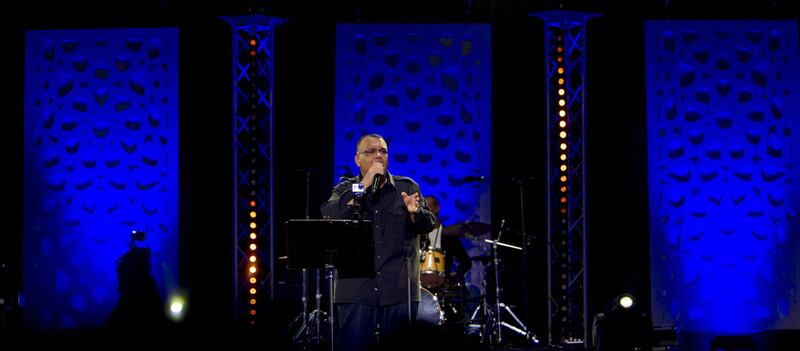In our eighth and final report from this year’s Mawazine festival in Morocco, we talk to veteran Kuwaiti singer Nabil Shuail about his new album and the challenges facing the new generation of Gulf artists.
Shuail, "The Gulf nightingale", has been a leading light of the regional music industry for three decades, with hits including Ya Shams, Shoufi Gheirou and Ma Arwa'ak.
With his new album, Mantiqi, he returns with a more stripped-down sound and a new set of hook-laden songs that are his catchiest yet. The album's success has been all the sweeter considering he has been recovering from a near-debilitating back injury.
It was recently reported you were in ill health. You look good, but are you feeling better?
I had a big back surgery and I recovered really well. There was a time when I was told I could be sitting in a wheelchair forever and I remember telling the doctor, you either give me the wheelchair now, or let’s operate. So I am glad we did it and I feel good. Sure, there is some discomfort at times, but I do feel very well. At the end of the day, the music itself doesn’t tire me as that comes from within. It’s all the exterior things, such as the long travel — that can be exhausting.
Your album Mantiqi has been well received. Is it accurate to say it is your most direct set of songs yet?
I think so. With Mantiqi I wanted to create a really simple album without too much production on it. I wanted people to focus more on the melodies and they are direct and straight to the point. I am really happy with the reception and I plan to go to Dubai to shoot the video for the song, also called Mantiqi, to release it, hopefully, soon.
Your son Shuail has recently launched a music career, with a few live performances. What are your thoughts on him following in your footsteps?
He is currently in university in Miami doing a degree in petroleum engineering. I advised him to just focus on his studies for now and view the music as a hobby. After he finishes his studies, if he still insists in following the music path, then I am more than happy to help him.
Your live shows stand out from the pack due to their often-unpredictable nature. How important is that for you?
I do like to keep my shows that way. It keeps things interesting for me and the band. I don’t have a set list when I step on stage, just a few ideas that I have. Then, depending on the vibe of the crowd, I decide how the show proceeds. My band know that I normally switch things up suddenly and they are always prepared.
This year there was talk about you taking legal action against some people who published a derogatory meme about you online. What was the story behind this?
That was totally reported out of proportion. Basically, there was an image of me that some young people thought was funny to make a meme of. They did it and some people in the media said that I was going to take this person to court. That’s because in Kuwait, the laws are strict in that I have the legal right to bring a case against people who even forwarded such messages online. I immediately started getting phone calls from the families of people who forwarded these messages urging me not to take action and, of course, I didn’t. While what they did is not funny, these people are young and, as an artist, you get used to these things. Besides, I am busy and I have other things to do.
You are part of a generation of veteran Khaleeji artists, which also includes the UAE's Hussein Al Jasmi and fellow Kuwaiti singer Abdullah Al Rowaished, that continue to shine. Are you surprised that none of the youngsters have taken up your mantle?
That’s a really good question, which should be discussed. The reason why I feel there are not many big names from this younger generation is that, in my opinion, too many people today are looking for popularity and fame too quickly. They don’t have the discipline to work hard and think long-term. As soon as they get a big song, it’s all about how much money they can get from appearances and concerts. They need to know that it is the song that became successful, not themselves. Whenever youngsters ask me for advice, I tell them to remain level-headed and keep working hard.
To read all the interviews from our Mawazine Sessions, visit https://www.thenationalnews.com/arts-lifestyle
sasaeed@thenational.ae






